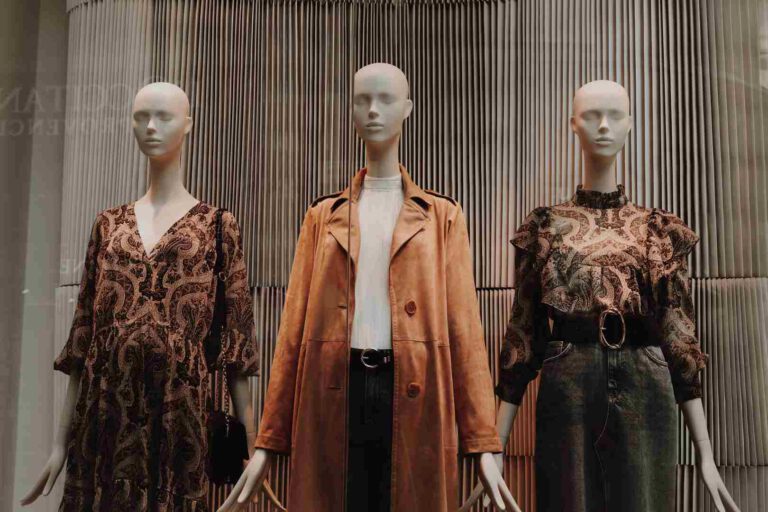Principles of ethical fashion purchasing
Contents:
- What is the fast fashion phenomenon?
- Responsible fashion – is that possible?
- What does ethical fashion shopping look like in practice?
In recent years, consumer awareness has increased significantly. More and more of us are not only asking ourselves about the quality of the products we buy in the clothing industry, but also about where the clothes come from, that is, in which country they are made and how they are produced. This proves that consumer habits are changing and we, as consumers, are looking for ethical and ecological solutions. Today we are talking about the phenomenon of fast fashion, or so-called junk fashion, which relies on the policy of short collections. Fast fashion producers are accused of polluting the environment and not always having ethical working conditions during production. Sustainable, ethical fashion is being offered as an alternative to fast fashion. What is this fashion, what are its rules and is it even possible?
What is the fast fashion phenomenon?
The fashion industry is the second most polluting industry after the fuel industry. Too many clothes are produced too quickly. This is because fast fashion means short-lived collections. In practice, this means that clothes advertised as new before Christmas go on sale as less attractive immediately after the holidays, and a completely new collection is released in the meantime. Unsold clothing often ends up in landfills or incinerators. This is an incredible waste, especially when you consider that growing cotton, which is used to make clothing, takes up huge amounts of land, requires the use of environmentally harmful pesticides, and also requires large amounts of water. There is a well-known example of the complete drying up of the Aral Sea, from which water was taken to sustain cotton plantations.
Responsible fashion – is that possible?
Those who indulge in fashion are also responsible for generating excessive and unnecessary waste. That's why it's so important, first, to avoid the false impression that we only need to replace our clothes every few weeks to get rid of "old" and supposedly unfashionable garments, and also to learn the basic principles of ethical shopping. Ethical fashion companies include:
- They use ecological and safe products such as linen , organic cotton or hemp fibers.
- Clothing is recyclable
- are safe for the environment and protect animal life,
- have recyclable packaging,
- They provide fairly paid jobs while respecting the right to rest.
What does ethical fashion shopping look like in practice? If ethical shopping is important to us, we should:
- know where the clothes offered by a particular store are made,
- pay attention to the materials the clothes are made of,
- support local brands,
- Choose clothes made from high-quality materials, even if the price is higher, so that the clothes do not get damaged after a few washes and serve us well for years.
- not to succumb to temporary, fast fashion that manufacturers want to force us to constantly replace clothes with new ones that correspond to current trends.
Trillions of items of clothing are produced worldwide every year—so much so that the scale of waste is truly enormous. Clothes that aren't sold are destroyed, burned, or simply thrown in the trash. However, we, the consumers, decide what we buy. We can continue to buy new clothes without worrying about the social or environmental costs, or we can start making fully planned and thoughtful purchases, and sooner or later, the clothing industry will have to adapt to the needs of a new, more conscious consumer. Another alternative to fast fashion is buying secondhand clothes from thrift stores.
THE PUBLISHER'S CHOICE
Dried plums 1 kg BIOGO
- £6.07
- £6.07
- Unit price
- / per
Dried White Mulberries 500 g ORGANIC
- £5.06
- £5.06
- Unit price
- / per
Almonds 1 kg BIOGO
- £10.13
- £10.13
- Unit price
- / per
Cranberries sweetened with apple juice organic 1 kg BIOGO
- £14.19
- £14.19
- Unit price
- / per
Dried dates 1 kg BIOGO
- £3.65
- £3.65
- Unit price
- / per
Unpeeled buckwheat groats 1 kg BIOGO
- £2.44
- £2.44
- Unit price
- / per
Walnuts 800 g BIOGO
- £7.50
- £7.50
- Unit price
- / per
Peeled sunflower seeds 1 kg BIOGO
- £2.63
- £2.63
- Unit price
- / per
PULLED ORGANIC SUNFLOWER SEEDS 1 KG BIOGO
- £3.85
- £3.85
- Unit price
- / per












































































































































